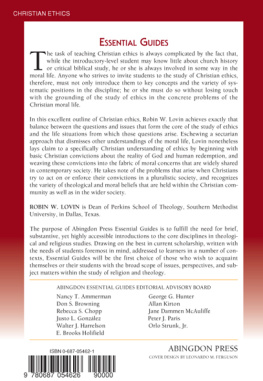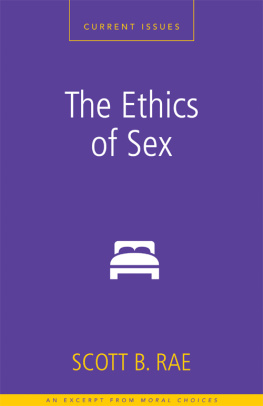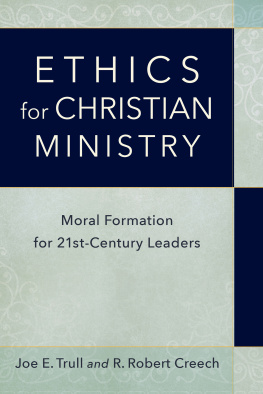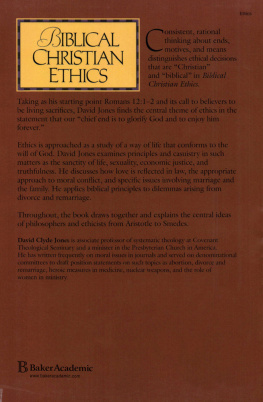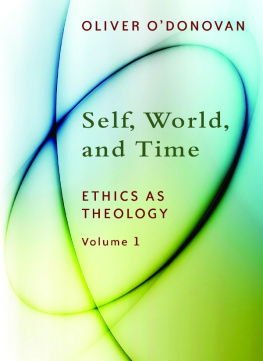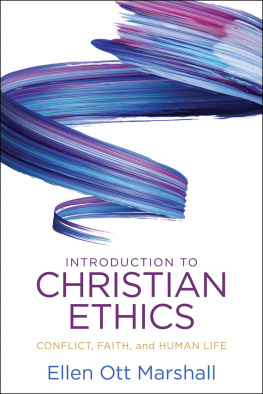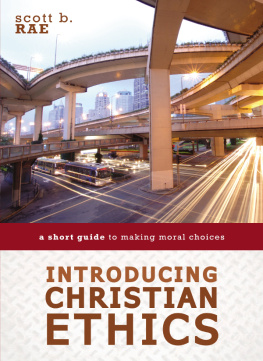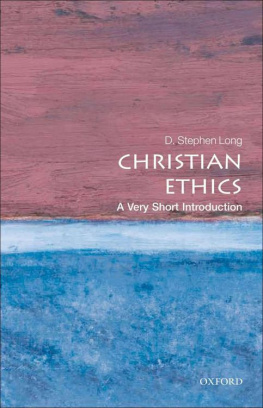CHRISTIAN
ETHICS
Abingdon Essential Guides
Editorial Advisory Board
Nancy T. Ammerman
Hartford Seminary
Don S. Browning
University of Chicago Divinity School
Rebecca S. Chopp
Candler School of Theology
Justo L. Gonzlez
Emory University
Walter J. Harrelson
Vanderbilt University Divinity School
E. Brooks Holifield
Candler School of Theology
George G. Hunter
Asbury Theological Seminary
Allan Kirton
The United Methodist Mission Resource Center
Jane Dammen McAuliffe
University of Toronto
Peter J. Paris
Princeton Theological Seminary
Orlo Strunk, Jr.
The Journal of Pastoral Care

CHRISTIAN ETHICS: AN ESSENTIAL GUIDE
Copyright 2000 by Abingdon Press
All rights reserved.
No part of this work may be reproduced or transmitted in any form or by any means, electronic or mechanical, including photocopying and recording, or by means of any information storage or retrieval system, except as may be expressly permitted by the 1976 Copyright Act or in writing from the publisher. Requests for permission should be addressed to Abingdon Press, 201 Eighth Avenue South, Nashville, TN 37202-0801.
This book is printed on recycled, acid-free paper.
Library of Congress Cataloging-in-Publication Data
Lovin, Robin W., 1946
Christian Ethics: an essential guide / Robin W. Lovin.
p. cm.(Abingdon essential guides)
Includes bibliographical references and index.
ISBN 0-687-05462-1 (alk. paper)
1. Christian Ethics. I. Title. II. Series.
BJ1251 .L69 2000 00-021985
241dc21 CIP
Scripture quotations, unless otherwise indicated, are from the New Revised Standard Version Bible, copyright 1989, by the Division of Christian Education of the National Council of the Churches of Christ in the United States of America.
Scripture quotations marked KJV are from the King James Version of the Bible.
00 01 02 03 04 05 06 07 08 0910 9 8 7 6 5 4 3 2 1
MANUFACTURED IN THE UNITED STATES OF AMERICA
Contents
Preface
E thics is a slightly mysterious subject to most people. Even those with a good deal of education may not have studied it directly, the way they once took courses in chemistry or literature. When journalists and commentators and members of Congress start talking about ethics, it is usually a warning that something has gone badly wrong. When we hear that an ethics committee is looking into someone's conduct, we do not assume that the investigation is because this person is being considered for an award for exemplary ethical behavior.
Yet ethics, in the original understanding of the term, is basically about the positive goals and directions we all set for our lives. Ethics is about how we try to become good people and shape for ourselves a life that is worth living.
For Christians, that effort cannot be separated from what we believe about God and about our relationship to God. Faith and ethics are inextricably linked, though not always in the simple way that we think when we try to please God by being good.
For the past two decades Ive been a teacher of ethics, mostly to women and men who were studying to be ordained ministers or scholars of theology, but also to people of all ages in church classrooms, professional seminars, lunchtime discussion groups, and continuing education programs. Often it is the most elementary teaching that is the most difficult because it involves sorting out some ways of thinking about the good life that are so familiar to us that we do not always realize we are thinking about it at all. There are no predetermined methods to be taught and no set answers to be learned. That is not because there are no right answers, but because it is in the nature of ethics that unless you come to the right answer for yourself, it is not really a moral choice.
Those of us who teach ethics have to learn to accept the fact that in this course everyone really does know the subject before the class begins. Still, there are some questions that need to be asked and some things we can learn from the experience of those who have gone before us.
This book is an attempt to share some of those questions and experiences with a wider audience. I appreciate especially the help of those who listened to me talk about these ideas while I was also trying to write about them: adult classes at First United Methodist Church, Highland Park United Methodist Church, and Northaven United Methodist Church in Dallas, Texas; Laity Week seminars in Dallas and in Anchorage, Alaska; and the local pastors in the Course of Study School at Perkins School of Theology. I am grateful to faculty colleagues and to my administrative assistant, Sue Ferrell, who helped me make the time to bring this project to completion, and especially to Chad Wilkes, who helped with the research, editing, and notes.
Robin W. Lovin
Dallas, Texas
July, 1999
CHAPTER 1
Choices
E veryone wants to have a good life. Aristotle (384322 BC), the Greek philosopher who gave us Western civilization's first systematic treatise on ethics, thought that everything we do aims at some good. Ethics is the study of that human good in its most general terms and how we human beings pursue it. Because all of us are pursuing it, one way or another, ethics is a subject in which almost everyone is interested.
For many Christians living twenty-three centuries later, Aristotle's view still seems to fit our situation pretty well. Thinking about how to live a good life occupies a lot of our time and attention. We seek satisfying and enduring personal relationships with people who enjoy sharing the same activities we enjoy. We want to build comfortable homes and secure futures for our families. We try to do good work and advance in our careers. Because we know that a good life is not built on material things alone, we also think about improving our health and expanding our minds. We try to figure out whether the entertainment we watch and the products we buy belong in a good life. We worry about how the emotions we feel on the job and the things we sometimes have to do to get our jobs done relate to a good life. We think about people whose faces we see in the newspaper or on television, people whose lives have been shaken by war or violence or natural disasters, and we wonder how their needs relate to our lives.
As Christians, we learn much of what we know about the good life through participation in churches and through personal prayer and Bible study. We take many of our images and the language of our questions from the Bible, especially from Jesus parables and lessons in the New Testament. We wonder whether we pay enough attention to people in need, whether they are around the corner or on the other side of the world, to live up to the ideal of compassion that we learn from the story of the good Samaritan (Luke 10:29-37). We worry that we may become like the rich fool who built new barns to hold the abundance of his goods, but couldnt see the poverty in his relationship to God (Luke 12:13-21). We would rather be like Mary, who knew what was really important, than like Martha, who exhausted herself trying to do too many things at once (Luke 10:38-42). We try to sort out our obligations, and we wonder whether we are really giving Caesar what belongs to Caesar and giving God what belongs to God (Luke 20:20-26).
We think a lot about how to live good lives, and we worry a lot about the commitments and conflicts that get in the way of living well. Although our concerns are often voiced in specifically Christian language, we know that this search for inner peace, integrity in relationships, and genuine care for other people is widely shared by our neighbors, whether or not they share our Christian faith. Over coffee breaks at work, in parents discussions at the public school, or just across the back fence on a weekend afternoon, we learn that the search for a good life is going on all around us. Increasingly, as travel, communication, and commerce shrink the globe and bring us into contact with people our grandparents never knew, we find that the questions that perplex us are being asked, perhaps in somewhat different ways, by people everywhere. Aristotle's ancient notion that seeking the good is something we all do seems to hold up well across the changes of history and the differences of culture.

